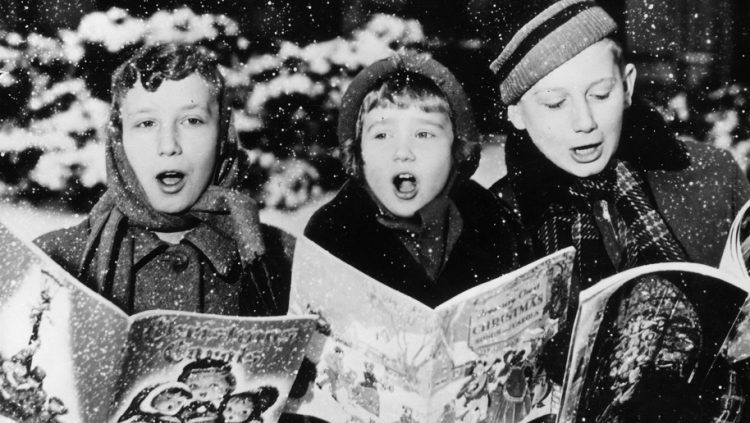Photo: Keystone (Getty Images)
There’s been quite the controversy surrounding the holiday classic “Baby, It’s Cold Outside.” And for good reason. It is the “date rape” song after all.
Radio stations pulled it after people caught on to the lyrics being quite suggestive to sexual assault. And it only took 65 years for people to object!
On the other hand, some stations are in protest of the backlash and are now playing the song on repeat.
But the best outcome of this Christmas controversy is the birth of the “politically correct” version of “Baby, It’s Cold Outside.” It’s garnered nearly 70 million views in one week.
At least dress festive, ya bum: The Mandatory 2018 Holiday Men’s Style Gift Guide
But the 1940s classic isn’t the only holiday song with weird lyrics or those we simply don’t understand. What the heck do these famous lines from holiday jingles mean?
Holiday watchlist: Netflix Christmas Specials To Stream Over The Holidays
Follow Mandatory on Facebook, Twitter, and Instagram.
Josh Helmuth is a sports reporter from St. Louis who contributes to Mandatory.
Confusing Holiday Lyrics
-
'Auld Lang Syne'

The lyrics from the song with the same title are sung across the globe every New Year's Eve. But what do they mean? “Auld lang syne” is Scottish-Gaelic and translates as “old long since,” or rather, "times long past," aka "days gone by."
Photo: Dynamic Graphics (Getty Images)
-
'Deck The Halls'

We've all sang this line from "Deck The Halls" countless times since we were little kids. But have you actually stopped to think about what the heck it is you are singing about? How do you "deck" a hall? And what is a "holly" of which you need multiple "boughs?" Well, "deck" essentially means to decorate. A "bough" is a large branch from a tree. And "holly" portrays a decorative, evergreen shrub you would essentially see as a wreath. Makes sense right? Because "decorate the halls with large tree branches and evergreen shrubs" doesn't quite have the same ring to it. Hooray for 1881 lyrics!
Photo: Devan Anderson (Getty Images)
-
'We Wish You A Merry Christmas'

Have you ever had figgy pudding? We haven't. Why don't you go to the store and pick up some figgy pudding? Do you know where to look? This line from "We Wish You A Merry Christmas" is basically talking about a treat similar to fruitcake, only figgy pudding is steamed, chocked with dried fruits and boozy. It's supposedly delish.
Photo: bhofack2 (Getty Images)
-
'Santa Baby'

We always thought this line from "Santa Baby" was about a car. But sable is a type of luxurious fur that is made into coats. This high-maintenance Santa-lover essentially wants a high-end fur coat or wrap for Christmas. She also sings about wanting a '54 convertible. Makes sense.
Photo: MariyaL (Getty Images)
-
'Winter Wonderland'

Who in the world is Parson Brown and why is he in one of the most famous Christmas songs of all-time? These "Winter Wonderland" lyrics from 1934 are referring to a minister or pastor, sometimes, back then, called a "parson." So if you're dressing up a snowman to look like a minister and you follow up with the line "He'll say, 'Are you married?' We'll say 'No, man, but you can do the job while you're in town!'" means you're proposing the snowman marry you as a Protestant pastor would. Fun times.
Photo: Jasmin Merdan (Getty Images)
-
'Have Yourself A Merry Little Christmas'

We obviously know "gay" means happy. But what are we trying to make happy, exactly in "Have Yourself A Merry Little Christmas?" Christmastime! "Yuletide" is an Old English word that refers to the old religious festival Northern Europeans celebrated hundreds of years ago. It's essentially the period between Dec. 24 and Jan. 6. So let's make Christmastime gay, baby!
Photo: Julius Reque (Getty Images)
-
'12 Days of Christmas'

While we know the "12 days of Christmas" is the period between Dec. 25 and Jan. 6, we don't quite know the origin of this famous Christmas classic and why they want a partridge in a pear tree so badly. There are multiple theories on the internet, we think VOX explains it best:
"The history of the carol is somewhat murky. The earliest known version first appeared in a 1780 children's book called 'Mirth With-out Mischief.' (A first edition of that book sold for $23,750 at a Sotheby's auction in 2014, but you can also buy a digital copy on Amazon.) Some historians think the song could be French in origin, but most agree it was designed as a 'memory and forfeits' game, in which singers tested their recall of the lyrics and had to award their opponents a 'forfeit' — a kiss or a favor of some kind — if they made a mistake."
Photo: shelma1 (Getty Images)







